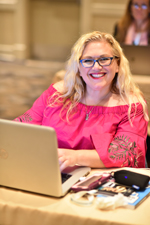
By Sandi Masori

SAN DIEGO — It’s always a treat when you’re at a show and the actors interact or appear in the audience. But Natasha, Pierre & The Great Comet Of 1812 takes it to another level completely. Currently playing at Cygnet Theater in Old Town, The Great Comet uses the entire audience as part of the stage.
At any given times actors might pop up from anywhere in the audience singing or playing an instrument in the kaleidoscopic modern opera. The effect is simply delightful, and I imagine that seeing the show multiple times from multiple seats would give you an entirely different perspective each time.
To quickly summarize the plot, written by Dave Malloy, it’s an adaptation of 70 pages from Leo Tolstoy’s War and Peace. Specifically the part that tells the story of the love triangle between young Natasha (Selena Ceja), Andrey (Brian Mackey), and Anatole (Michael Louis Cusimano), as well as the existential crisis of Pierre (Kurt Norby).
Everything is done in song, including the stage directions. At one point, for example, Ceja sings about Natasha laying across the couch as she lays down on the floor. This clever way of describing what is happening means that sets and props aren’t as necessary. The stage is set to look like an old opera house, and even has audience seats on it, turning it into a theater-in-the-round of sorts. Some chairs and small props are brought onto the main part of the stage, as needed, and in front of the on-stage 7-piece orchestra, there is a stationary armchair where Pierre sits reading or sleeping while other things happen in the story.
Let’s talk about the songs- this cast can sing! It’s hard to focus my accolades on any particular actor because the entire cast is so incredibly talented. Even with all the talent, Ceja’s wonderfully playful expressions telegraphed much about her character and made her stand out in the lead role. When she finds out the Anatole has romantic feelings for her, her delighted expression of “oh my G-d” is wonderfully relatable to anyone who has been or has had teen girls.
The very first song brings the audience up to speed with the characters by teaching us that “Balaga (Luke H. Jacobs) is fun. Bolkonsky (Brian Mackey) is crazy. Mary (Brittany Adriana Carrillo) is plain. Dolokhov (Tanner Vydos) is fierce. Helene (Jasmine January) is a slut. Anatole (Cusimano) is hot. Marya (Linda Libby) is old-school. Sonya (Megan Carmitchel) is good. Natasha (Ceja) is young. And Andre (Mackey) isn’t here. And what about Pierre (Norby)?” These keywords really give us what we need to know about each character to follow the action. And if you start to wonder why a character might do the thing that they’re doing, refer back to their main keyword to remember why they might act that way. Natasha wanting to throwing her life away for a scoundrel of a man who flatters her and whom she only just met. Why would she do that? Well she’s young. Why would Sonya tell on her and stop it from happening? Because she’s good!
Several members of the cast become part of the orchestra at times as well, picking up a guitar or an accordion and playing along, often, as mentioned before, from various positions in the audience.
Though the play is set in 1812, they also use anachronistic elements like color changing Poi (balls that are attached to hand-held chains and rhythmically swung around) for a disco scene, and even a laptop computer. The total effect is one of delightful chaos.
And there was even a momentary Jewish connection, as at one point Pierre talks about how he has been studying Kabbalah.
There is definitely a sense, especially in the beginning, of “I don’t know what is going on, or where to look, but the music and singing is so good I like it and I find I’m thoroughly enjoying it.”
The only real criticism I have is about the programs- in the first song, the cast tells you to check your programs to learn more about the characters, but at the same time, Cygnet pushes everyone to download the digital program in lieu of getting a printed program. You can’t have your phone out during the performance of course. While I understand the reasons to move to digital programs over physical ones, both to save costs and paper waste, I feel it diminishes the experience, and at 51, my eyes don’t love the pinching and stretching required to look at such things on my phone. I just like the feel of the paper in my hand and the ability to flip the pages. I did eventually get one of the limited quantity paper programs, but I had to ask a few times and almost felt scolded each time, and felt it was almost grudgingly handed over. I’m not sure what the answer is or how to strike the balance between meeting the demand, and keeping costs and waste down.
The Great Comet as it’s nicknamed plays through May 19.
*
Sandi Masori is a theater and restaurant reviewer for San Diego Jewish World